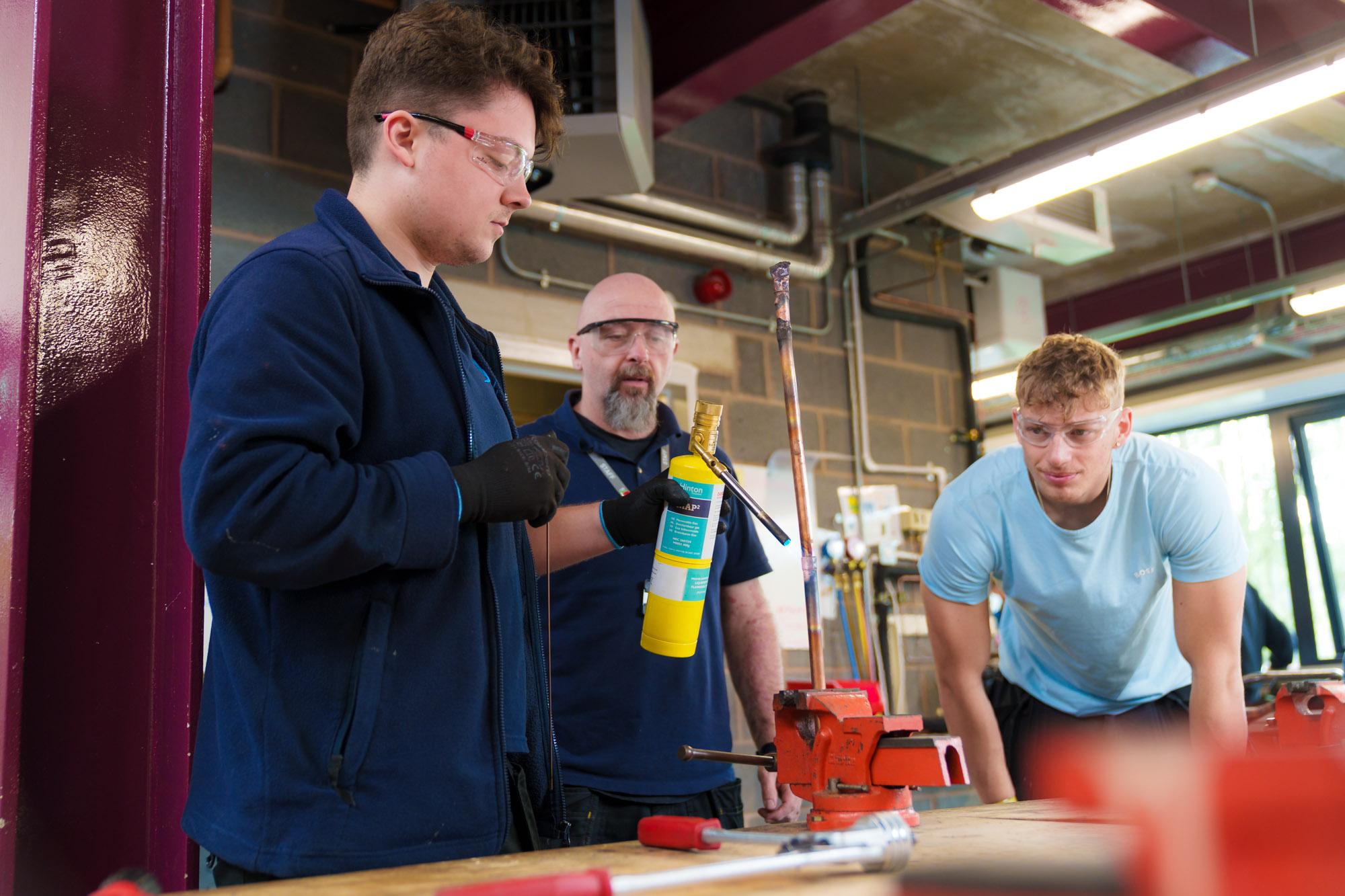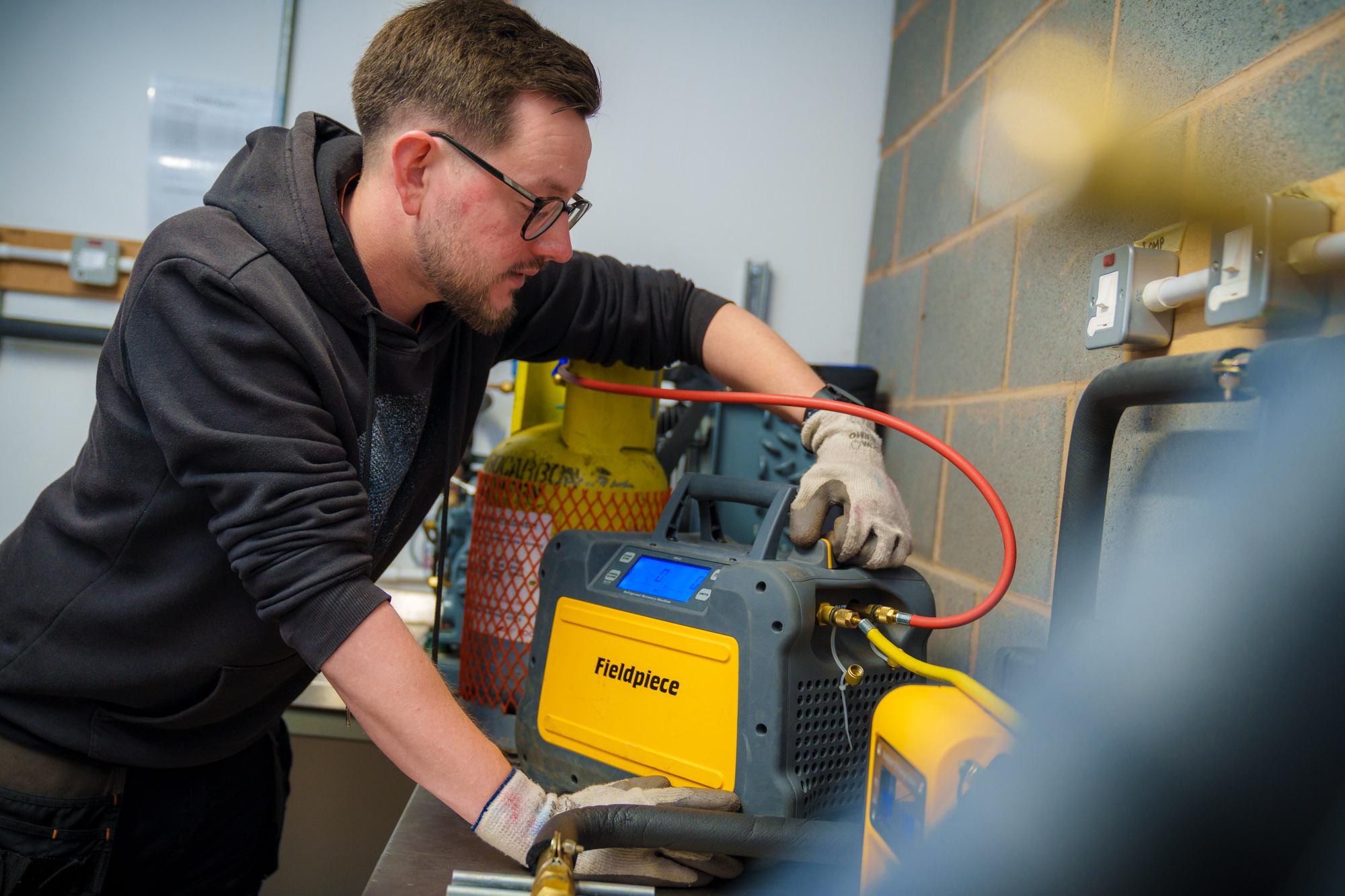Level 3 Refrigeration and Air Conditioning Technician
Duration: 33 Months (Plus 3 months EPA)
Refrigeration and Air Conditioning Technician
If you’re looking to start a career in refrigeration, air conditioning, and heat pump systems, this apprenticeship will give you the skills and knowledge to succeed. As an Engineering Technician, you’ll be involved in the design, installation, maintenance, and servicing of systems used across a variety of industries, from food production to healthcare.
The programme combines e-learning, practical training, and one-on-one coaching at our Wythenshawe training centre, along with hands-on experience in the workplace. You’ll gain the skills needed to understand processes and maintain professional development, ensuring you’re ready to excel in this essential field.


Topics, units and assessments
As part of the apprenticeship you will learn about:
- Understand and apply safe working practices, environmental protection measures, and scientific principles in Building Services Engineering and MES, including handling refrigeration systems and Fluorinated gases.
- Install, test, and maintain refrigeration systems, including fault finding, and apply pipework fabrication techniques for RAC systems.
- Work with complex RACHP systems, including commissioning, troubleshooting, and applying fundamental principles to their operation.
- Plan, organise, and manage work for RACHP systems, ensuring proper site preparation and adherence to safety standards.
- Understand electrical power and control systems for RACHP systems, integrating them into overall system functionality and maintenance.
As part of the End Point Assessment (EPA), you will be expected to complete:
- EPA 1: A theoretical knowledge test using multiple choice questions
- EPA 2: An examination comprising of two practical tests including a retrofit (changing of a refrigerant in a working system) and fault finding (to identify and rectify faults)
- EPA 3: A professional interview, which is designed to further explore the apprentice’s knowledge relevant to their role and to assess if the apprentice’s occupational behaviours meet the requirements specified in the apprenticeship standard.
How you’ll learn
This programme of study is delivered through a mix of e-learning, self-study, practical skills training and one-to-one coaching facilitated by Total People at the Total People training centre in Wythenshawe.
Off the job training is a critical and important element within this apprenticeship. Apprentices must complete the minimum requirement of six hours of off the job training per week or the equivalent over the practical learning duration (20% of capped 30 working hours).

-
Refrigeration and Air Conditioning Engineer
A Refrigeration and Air Conditioning Engineer is responsible for installing, maintaining, and repairing cooling systems used in commercial, industrial, and residential settings.
-
Heating Ventilation and Air Conditioning Engineer
a HVAC Engineer is responsible for installing, maintaining and troubleshooting HVAC systems. They ensure that environments meet energy-efficient regulations.
-
Assistant Engineering Manager
An Assistant Engineer supports senior engineers in designing, developing, testing, and maintaining projects in various fields, such as civil, mechanical, electrical, or software engineering.
-
Technical Support Technician
A Technical Support Technician provides essential troubleshooting and technical support for engineers and clients. They assist in diagnosing and resolving issues with HVAC and refrigeration systems.
-
Enhance Workplace Safety and Compliance
Apprentices receive up-to-date training on industry safety regulations, risk assessments, and compliance, helping to maintain a safe working environment.
-
Improve Workforce Productivity and Service Quality
By training apprentices on the latest tools, techniques, and safety protocols, businesses can increase efficiency, reduce errors, and improve overall service delivery.
-
Address Industry Skill Shortages & Build Future Talent
As the demand for skilled tradespeople grows, apprenticeships provide a reliable way to develop new talent, reducing reliance on external hires, ensuring long-term workforce stability.
-
Cost-Effective Training with Government Support
Apprenticeships allow businesses to train employees in-house at a lower cost, through government funding while apprentices learn company-specific processes.

Employer Hub
Get the information you need on how apprenticeships can benefit your business.
Our Employer Hub provides clear guidance on how apprenticeships can help your business thrive, plus all the details about funding and support you'll get every step of the way to make apprenticeships a key part of your workforce strategy.
Employer SolutionsIt was been a good opportunity to learn the profession that I am interested in without any costs.
Tomasz, Refrigeration and Air Conditioning Apprentice
